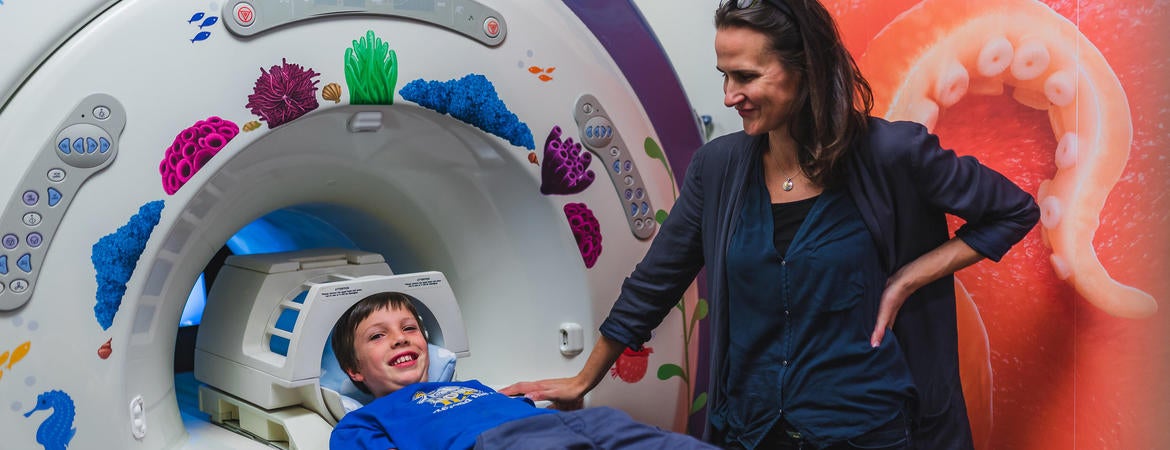College of Humanities, Arts, and Social Sciences

The Department of Psychology has a new and innovative way of preparing patients for scans inside a Magnetic Resonance Imaging (MRI) machine, a narrow, tube-like structure that requires patients to lay completely still for several minutes. Psychology Professors Kalina Michalska and Aaron Seitz, along with four engineering students, Sebastian Shah, Sam Muku, Mena Mishreky, and Swathi Vittalbabu, built a mock MRI scanner and installed it on the Psychology building’s first floor. Its purpose? To help prepare claustrophobic patients for an MRI’s tight conditions.
Michalska, who works with children, notes that there are many families and kids with no experience with neuroimaging. The machine affords children the opportunity to get a practice run inside, she said, complete with the sounds and conditions that they might experience during an actual MRI scan.
“When we describe it to them, they don’t know what to expect… and they’re a little bit afraid of it,” Michalska said. “We can show them that it’s not really as scary as they imagine it to be.”
This is especially important because MRI scans can cost as much as $500 an hour, and if a patient is uncomfortable during the exam, matters can grow more complicated and expensive. According to Michalska, when a patient moves during an MRI scan, the data is botched, and they have to schedule another appointment. Psychology’s practice machine helps to eliminate these difficulties by ensuring patients know exactly what’s in store during their scan.
The journey to obtaining this machine was long and arduous. Michalska requested a mock machine from a company before, but the project fell through. After a year, the project seemed all but lost. However, BC Technical -- a large medical imaging company based in Utah-- offered one of their showroom machines that they use for demonstrations at conventions.
“It was a miracle gift,” Seitz said. “For them to offer it changed everything.”
Once the MRI machine was delivered from BC Technical to the Psychology building, Michalska and Seitz were faced with a new problem: It was too big to fit through the door. The only option was to dismantle the machine, and then put it back together somewhere inside the building.
So, they began to make phone calls, asking for companies that would be willing to take on such a challenge. No company wanted to undertake the task, stating that they were not comfortable with doing such work on a machine, according to Seitz.
Help came in quite the unexpected way, however, as a group of students from the Marlan and Rosemary Bourns College of Engineering rose to the challenge. Since April, they have been constantly making modifications to the mock scanner to improve performance, according to Jay Melashenko, Psychology’s Financial Administrative Officer.
“The fact that the mock scanner didn’t come with any instructions was a challenge,” Melashenko said. “The students came up with some creative methods along with the professors in order to get it working.”
Melashenko recalled a time when the tubing was a bit too short for the patient table to pass into. “The students used a playground tunnel and painted it white to match the inside of the MRI machine,” he said.
According to Seitz, funding was donated from the Department of Psychology, CHASS, Graduate School of Education, Department of Psychiatry, and the Office of Research and Economic Development. “In addition to funds,” he said, “staff from each of these units and others on campus put in many hours navigating the process from beginning to end.”
The MRI mock scanner is currently in a usable state, according to Melashenko, but there will be constant improvements and updates. Its first official usage by Michalska and her team could happen as soon this month.